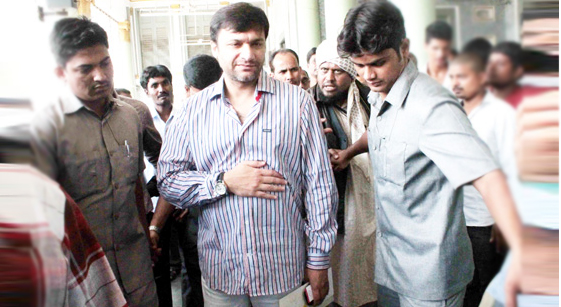Hyderabad: Media overdrive in coverage has come in for sharp criticism by a judge of the Nampally Criminal Court, which is hearing the sensational case relating to the alleged attack on Majlis-e-Ittehadul Muslimeen (MIM) floor leader and Chandrayangutta MLA Akbaruddin Owaisi at Barkas in 2011.
The reportage relating to the court proceedings on Tuesday, which appeared on Wednesday in newspapers and attracted disproportionate and speculative television coverage, was brought before the judge by the public prosecutor on Wednesday. The judge then instructed court masters to bar media from covering the trial. Several AIMIM MLAs and followers of Akbaruddin Owaisi had entered the court as the MIM floor leader was taken in amid tight security to face the 13 accused in the opposite box.
Fearing clash between Mohammad Pahalwan’s follower’s and those of AIMIM, over 100 policemen were deployed at the court during the proceedings of the trial. Keeping in view the sensitivity of the issue, the court has imposed restrictions, said an advocate. The city has witnessed cases being filed against publications that report court proceedings. The Cyberabad Police registered a criminal case U/s 228 – A of IPC and Sec 23 of POSCO Act – 2012 against a daily for violating the law by disclosing the identity of a juvenile in conflict with law.
The news item in question was published under ‘Quthbullapur’ dateline on August 31, 2015 by its reporter. The Cyberabad Police registered the case suo motu at the Pet – Basheerabad Police Station. Earlier, a Telugu newspaper was fined Rs. 1,000 for disclosing the identity of a girl who stabbed her husband for pressurising her to consummate the first night even as she had been begging him to allow her to complete her Class X exams. A news anchor had uttered her name 58 times in the crime story. Magistrate Vijaya Lakshmi delivered the judgment in 2006.
What does Section 228 A of IPC say?
Disclosure of identity of the victim of certain offences etc.—
(1) Whoever prints or publishes the name or any matter which may make known the identity of any person against whom an offence under section 376, section 376A, section 376B, section 376C or section 376D is alleged or found to have been committed (hereafter in this section referred to as the victim) shall be punished with imprisonment of either description for a term which may extend to two years and shall also be liable to fine.
(2) Nothing in sub-section (1) extends to any printing or publication of the name or any matter which may make known the identity of the victim if such printing or publication is—
(a) By or under the order in writing of the officer-in-charge of the police station or the police officer making the investigation into such offence acting in good faith for the purposes of such investigation; or
(b) By, or with the authorisation in writing of, the victim; or
(c) Where the victim is dead or minor or of unsound mind, by, or with the authorisation in writing of, the next of kin of the victim: Provided that no such authorisation shall be given by the next of kin to anybody other than the chairman or the secretary, by whatever name called, of any recognised welfare institution or organisation.
Explanation.—For the purposes of this sub-section, “recognised welfare institution or organisation” means a social welfare institution or organisation recognised in this behalf by the Central or State Government. (3) Whoever prints or publishes any matter in relation to any proceeding before a court with respect to an offence referred to in sub-section (1) without the previous permission of such Court shall be punished with imprisonment of either description for a term which may extend to two years and shall also be liable to fine.
Explanation. —The printing or publication of the judgment of any High Court or the Supreme Court does not amount to an offence within the meaning of this section.
Courtesy: MetroIndia

